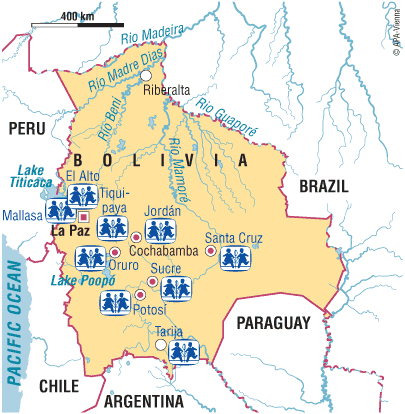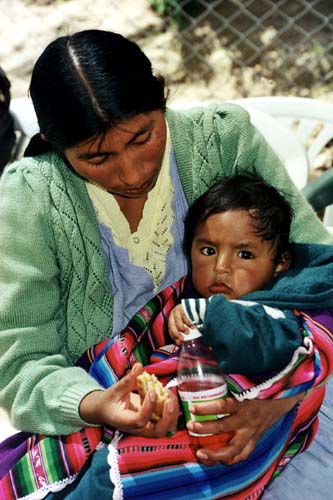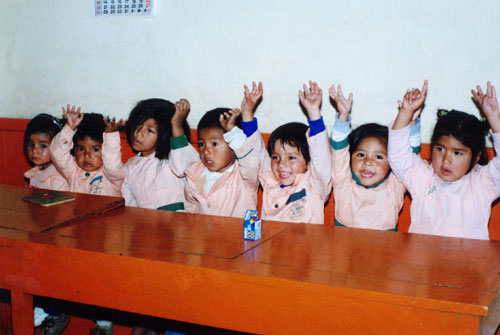SOS Children in Bolivia

Landlocked in the centre of South America between Chile, Peru and Brazil, Bolivia is dominated by the Andes Mountains which make vast areas of the country inaccessible.
Bolivia is the poorest country in South America. Stagnating agriculture, declining industrial production, rising unemployment, high inflation and massive foreign debts are the main features of the economic situation. Since early colonial times, mining for precious minerals and metal ores has been an important part of Bolivia's economy but the collapse of tin prices in 1985 had a devastating effect on the economy and the lives of the people, while the growth in the production and trade of illicit drugs has heightened social tension and violence.
Around 40 per cent of the population still live in rural areas and are employed in agriculture which suffers from antiquated methods and inadequate transportation. Health conditions are poor. The infant mortality rate is among the highest in South America with one in ten children dying before their fifth birthday. Malaria, dysentery and TB are common. Medical services and hospitals are inadequate, particularly in rural areas.

The charity began its work in Bolivia in 1968, when the first SOS Children's community was established in the centre of Cochabamba, Bolivia's second largest city.
SOS Children's Villages began its work in Bolivia in 1968. Today there are nine SOS Children's Villages providing family homes for over 1000 children. In addition there are 32 projects attached to the villages providing education, social and medical care for children and their families in the local communities.
El Alto was opened in 2003. It is situated on the outskirts of La Paz, the administrative capital of Bolivia. It has 12 family houses and a kindergarten.
Jordan is on the outskirts of Cochabamba, Bolivia’s third largest city. The SOS Children's Village began life as an orphanage run by an order of nuns and was converted in 1968 into an SOS Children's Village. The first in Bolivia. Today it has 10 family houses, a kindergarten and a vocational training centre.
Mallasa is on the outskirts of La Paz and has 12 family houses, a primary school and two vocational training centres - sewing and embroidery workshops, a cabinet-maker's shop and electrical, mechanical and printing workshops.
Oruro is about 140 miles south of La Paz in what was once a prosperous mining area and is now an area of great poverty. The village consists of 12 family houses, a kindergarten and two social centres.
Potosi is about 340 miles south of La Paz and, at over 13,000 feet above sea level, is one of the highest cities in the world. It was one of the richest cities in the world, its fortune based on silver mining, but it is now an area of high unemployment and poverty with children begging on the streets a part of everyday life. The village has 12 family houses, a kindergarten and two social centres.
Santa Cruz is in the eastern central plains of Bolivia and has important road and rail links with Brazil and Argentina. The village consists of 12 family houses, a kindergarten, a primary school and two social centres.
Sucre is the official capital of Bolivia and was designated a UNESCO World Heritage Site in 1991 because of its history and its architecture. The SOS Children's Village has 12 family homes, a kindergarten and two medical centres.
Tarija in the south of the country near the border with Argentina is the centre of the Bolivian wine trade. The SOS Children's Village has 12 family homes, a kindergarten, a day-care centre and a medical centre.
Tiquipaya is on the outskirts of Cochabamba and has 10 family houses, a kindergarten, vocational training centre, and a social centre.
As well as the children's villages, there is a wide range of associated SOS facilities in Bolivia helping local communities. The SOS Children's Village Tiquipaya has an SOS Social Centre which provides day-care facilities for working couples and single mothers, as well as basic health care for low income families in the neighbourhood. Paediatric, dental and gynaecological treatment are available as well as emergency first aid and counselling. There are eleven similar SOS Social Centres throughout Bolivia.
To counteract the high rate of illiteracy, two SOS Schools and five SOS Vocational Training Centres have been established, all of which are open to children and young people from both SOS Children's Villages and local communities. The centre at La Paz has sewing and embroidery workshops, a cabinet-maker's shop and electrical, mechanical and printing workshops.
Following the earthquake which struck Bolivia in 1998, SOS Children established an emergency relief programme providing food, medical care and shelter, as well as temporary accommodation for over 500 children separated from their families in the disaster.
Local Contacts

SOS Children in Bolivia:
Asociación Nacional de Aldeas Infantiles SOS Bolivia
Calle Mendez Arcos 776
Casilla 14322
La Paz
Bolivia
Tel: +591/2/24 11 334 (24 12 343)
Fax: + 591/2/24 14 581
e-mail: aisos@caoba.entelnet.bo
Next Country: Botswana